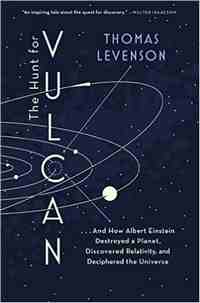The Hunt for Vulcan by Thomas Levenson
 Friday, March 4, 2016 at 9:31AM
Friday, March 4, 2016 at 9:31AM 
Published by Random House on November 3, 2015
Despite the title, The Hunt for Vulcan is not about the search for Mr. Spock’s home planet. It is, as Thomas Levenson explains, “a cautionary tale: it’s so damn easy to see what one wants or expects to find.” That is just as true for scientists as it is for everyone else.
Vulcan is the name given to a planet that never existed. Levenson traces its origin to theories of celestial motion that Robert Halley and Isaac Newton rather stunningly worked out using, I suppose, quill pens and infant telescopes. After praising Newton and Halley, Levenson tells of subsequent scientists who took up Newton’s quest to construct a mathematical model that would account for the behavior of every object in the universe. Newly discovered objects (Uranus and its wobbly orbit) as well as newly discovered phenomena (Jupiter apparently speeding up in its orbit, Saturn apparently slowing down) inspired refinements of Newton’s model of gravitation. Not all of them were accurate, but Uranus’ wobble led to the discovery of Neptune.
The next scientist who receives extended discussion is tobacco engineer-turned-astronomer Le Verrier. Having predicted Nepture’s discovery in order to account for Uranus’ wobble, Le Verrier concluded that another celestial body would account for Mercury’s precession. That “planet” came to be known as Vulcan. Its existence was widely accepted not only because Le Verrier endorsed it, but because a credible amateur astronomer believed he observed it.
Scientists bent over backwards to believe that Vulcan existed because, without it, something seemed to be amiss in Newton’s theory of gravity. Rather than committing an act of scientific heresy by suggesting that Newton was wrong, scientists embraced Vulcan, and even calculated its orbit, despite the troubling absence of Vulcan from the visible sky. Leave it to Albert Einstein to pop their Newtonian bubble and explain Mercury’s wobble in a way that did not rely on a fictitious planet.
The story of Vulcan is the story of how (some) scientists invent facts to fit observed phenomena into accepted theories to which they steadfastly cling. As Levenson notes, an empirical fact that “refuses to conform to the demands of a theory invalidates that theory, and requires the construction of a new one.” Yet scientists have often found it easier to construct new facts than to abandoned cherished theories -- hence the construction of Vulcan, a planet or group of asteroids (perhaps concealed by the sun’s glare) that must exist if scientists were to keep faith with Newton.
The book is also a tribute to great minds and, by extension, to open minds that are willing to search for new theories when flaws in the old ones become apparent. Yet despite Levenson’s veneration of great minds, he reveals great character flaws (most notably, great egos) that bedevil the best and the brightest ... with the possible exception of Einstein, who seems like a genuinely nice guy. In addition to setting the time and place in each chapter, Levenson scatters interesting biographical facts about the scientists who advanced the understanding of celestial mechanics. (Edison’s contribution to the story consists primarily of shooting a stuffed jackrabbit on a hunting trip.) Perhaps the book strays too far off course when, near the end, it discusses the politics of scientists in World War I, but a little padding is a forgivable sin in a book this short.
When scientists are the intended audience of science writers, I can’t keep up with jargon and math. When a book is so dumbed down that it assumes all nonscientists dropped out of school after seventh grade, I get bored and/or irritated. It always pleases me to find a science writer who uses engaging prose that allows me to grasp (albeit incompletely) concepts about which I know little. Levenson is one of those writers. He writes with passion about the tense joy of observing an eclipse. He is equally passionate about the history of science. That passion, combined with his clarity of expression, makes The Hunt for Vulcan a valuable read for those of us who don’t have degrees in physics. It is even more valuable as a reminder that ideas, once proven wrong, need to be replaced with better ideas.
RECOMMENDED
Reader Comments